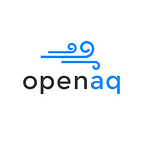To celebrate Open Data Week, OpenAQ hosted a happy hour on Mar 3, 2020 at Circa Brewing Co in Brooklyn, NY bringing together over 25 community members to discuss the importance of open air quality data and make new connections in a fun, informal setting. To make things more interesting and informative, experts from nonprofit, government, academic and private sectors gave lightning talks about their air quality-related work.
Sruti Modekurty from OpenAQ gave an overview of OpenAQ’s mission, community and data platform. She provided examples of how people from diverse sectors have utilized the data available on the OpenAQ platform, from NASA researchers who created air quality forecasting models, to data-driven journalists at Bloomberg Green, to citizen scientists in Ghana who pushed for a more robust air quality monitoring network. Sruti also briefly shared OpenAQ’s upcoming projects, including the Low Cost Sensor Pilot, and how people can get involved.
Chris Huskey and Masha Pitiranggon from NYC Department of Health and Mental Hygiene spoke about the city’s air quality monitoring efforts. The NYC Community Air Survey gathers street-level data throughout the city once every season. Chris explained that the city has set up their own air quality monitors to collect real-time data, which will be available through an API soon. Masha explained how both types of data along with other information, help city officials better understand the sources and health effects of air pollution and plan measures to reduce it.
Nathan Pavlovic from Sonoma Technology talked about open data tools scientists and citizens rely on during wildfire, smoke, and air quality events. He talked about the importance of having real-time air quality data, especially when fires and other hazardous events occur. He also shared a bit of history behind EPA’s AirNow system, which began in 1998. Some of the highlighted tools include NOAA’s Hazard Mapping System, NASA’s Worldview Satellite Data and SmokeSense, a mobile app for citizen science.
Dr. Darby Jack from Columbia University’s Mailman School of Public Health spoke about the health effects of air pollution exposure among bicycle commuters in NYC. Small sensors attached to bicyclists collected data to measure and calculate the actual amount of pollutants inhaled. The data showed an increase in blood pressure and heart rate and helped map out the most polluted bike paths around the city (often alongside truck routes). But bikers don’t despair: the benefits of biking still outweigh the negative health effects of pollution exposure.
Liz Barry and Eymund Diegel from Public Lab shared examples of community science around NYC and the country. Liz explained how people were able to use small and inexpensive sensor setups to collect data as evidence, like air quality samples using buckets and aerial photos using balloon cameras, to hold companies and governments accountable. Eymund spoke about the importance of grassroots data collection efforts, like the one he leads to use kite and balloons cameras as mapping tools to trace the original waterways underneath Gowanus.
All of these talks highlighted the importance of open data collection at all levels, from citizens to international governments, and the positive impact of the data, from measuring public health to instigating policy change. It was great to see some familiar faces from the OpenAQ community and welcome some new members!
